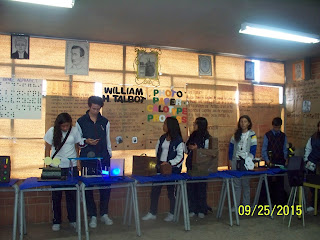RELATIVE
CLAUSES or RELATIVE PRONOUNS
Relative clauses are clauses starting with
the relative pronouns who*, that, which, whose, where, when. They are
most often used to define or identify the noun that precedes them. (Utilizamos los pronombres relativos
para referirnos a un sustantivo (una persona o una cosa) mencionado antes y al
que queremos agregar más información o modificar. Algunos pronombres relativos
se pueden usar sólo con personas, otros sólo con cosas y algunos con ambos).
1.
THAT: Que
(persona, cosa)
“That” es el pronombre relativo más utilizado en inglés hablado, ya que se
puede utilizar tanto con personas como con cosas. Se utiliza para sustituir “which”, “who” o “whom”
en cláusulas que definen el sustantivo.
Ejemplos:
|
|
This is
the book that won the Pulitzer prize last year. (Este es
el libro que ganó el Permio Pulizer el año pasado.)
|
|
|
This is
the restaurant that received the excellent reviews in the newspaper. (Este es
el restaurante que recibió excelentes críticas en el periódico.)
|
2. WHICH: que, cual (cosa)
“Which” sólo se puede utilizar con las cosas.
Ejemplos:
|
|
My new
job, which I only started last week, is already very stressful. (Mi
nuevo trabajo, que acabo de empezar la semana pasada, ya es muy estresante.)
|
-
|
|
The house
in which we lived in when we were children burnt down last
week. (La casa en la
que vivíamos cuando éramos niños se quemó la semana pasada.)
|
3.
WHO: que,
quien (persona)
Solo se puede utilizar “who”
con personas.
Ejemplos:
|
|
My
sister, who just moved in with me, is looking for a job. (Mi
hermana, que se acaba de mudar conmigo, está buscando un trabajo.)
|
4.
|
|
I never
met someone who didn’t like music. (Nunca
he conocido a alguien que no le guste la música.)
|
4.
WHOM: que,
a quien (persona)
“Whom” se utiliza para hacer referencia al objeto indirecto
del verbo, pero no lo utilizamos mucho en inglés coloquial. Más a menudo
utilizamos “who”
en vez de “whom”.
Ejemplos:
|
|
The woman
with whom I was talking to was my cousin. (La
mujer con quién estaba hablando era mi prima.)
|
-
|
|
This is
Peter, whom I met at the party last week. (Este es
Peter, a quien conocí en la fiesta la semana pasada.)
|
5. Whose: cuyo (persona, cosa)
El uso de “whose”
indica posesión, tanto para las personas y las cosas.
Ejemplos:
|
|
That is the
girl whose parents got divorced last year. (Esa es
la chica cuyos padres se divorciaron el año pasado.)
|
-
|
|
Paul, whose wife just had a baby, will not be at work for a few
weeks. (Paul, cuyo
esposa acaba de tener un bebé, no irá a trabajar durante unas semanas.)
|
6. WHEN AND
WHERE
Estos adverbios se refieren a expresiones de tiempo, lugares o motivos.
Ejemplos:
|
|
The
university where I teach is an excellent school. (La
universidad donde enseño es una escuela excelente.)
|
-
|
|
Can you
tell me when is the best time to call? (¿Puedes
decirme cuando es la mejor hora para llamar?)
|
INGRESA A LOS SIGUIENTES LINKS Y PRACTICA














































